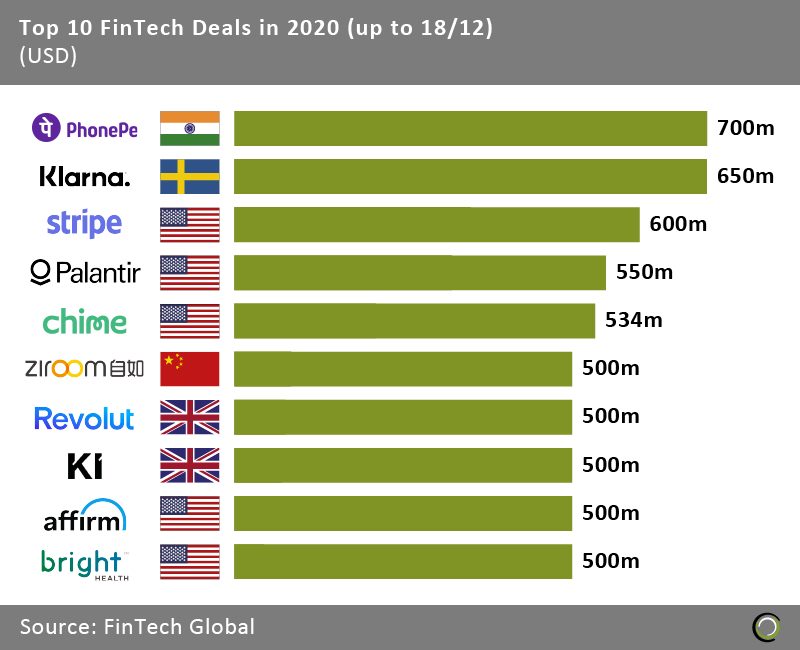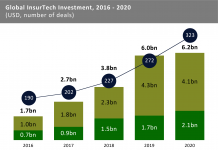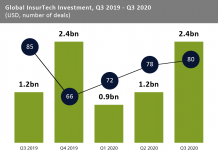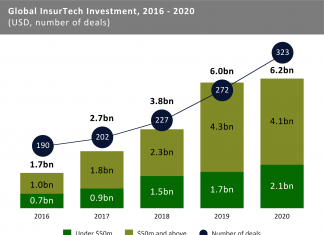Massive amounts of capital have been injected into the FinTech industry in 2020, but ten companies raised bigger rounds than the rest.
The global FinTech industry has continued to grow despite coronavirus lockdowns, toxic US elections and general market uncertainty. At the beginning of the year, as governments around the globe introduced new social distancing measures, market stakeholders were uncertain that investors would like to make any new cash injections.
However, it seems as if the FinTech industry has still been able to attract tremendous amounts of funding. Interestingly, if we look at the ten biggest rounds raised this year, it is clear that Covid-19 could’ve actually worked as a catalyst for their growth.
The pandemic forced more people to accept digital payment alternatives to do their shopping to avoid catching the contagion. As a result, several of the companies on the list have been able to scale.
If you want to find out how, then check out the full list below.

PhonePe’s massive $700m round
Indian payment app PhonePe partially spun out of Flipkart earlier in December. At the same time, it announced that it had raised a huge $700m round led by Walmart. The raise was also supported by prior investors and pushed PhonePe’s valuation past the $5.5bn mark.
Flipkart had acquired the Bangalore-based FinTech in 2016 and the new partial spinout would reduce its ownership from 100% to 87%.
“This partial spin-off gives PhonePe access to dedicated long-term capital to pursue our vision of providing financial inclusion to a billion Indians,” said Sameer Nigam, founder and chief executive of PhonePe, at the time.
Then, to round it all off, PhonePe announced just a few days later that the company had topped up its coffers with an additional $20m investment from Flipkart.
The round that turned Klarna into Europe’s most valuable FinTech
‘Twas the month of September when the news hit the wire: Klarna had secured $650m in a funding round that had pushed its valuation up to $10.65bn. Not only did that mean that the Swedish buy now, pay later enterprise had joined the coveted unicorn club of companies worth over $10bn, but it had also landed it the honour of being named Europe’s most valuable privately owned FinTech company.
Silver Lake, the technology investment company, led the round. Other backers participating in the raise included Singaporean wealth fund GIC, BlackRock and HMI Capital. Moreover, Merian Chrysalis, TCV, Northzone and Bonnier have acquired shares from existing shareholders.
The round also sent the rumours that Klarna was looking to go public in a not too distant future into overdrive. In fact, the venture’s co-founder and CEO Sebastian Siemiatkowski even said that the plans were that an initial public listing were in the cards within the next two years.
Since making the raise, Klarna has remained busy, adding a new chairman to its board that could take it through an IPO, been caught up in a war of words with rival Afterpay, fought a legal battle with drug lord Pablo Escobar’s brother, been celebrated as another evidence for the strength of the emerging Swedish FinTech ecosystem, and faced growing competition in the BNPL market.
In other words, watch this space as the final word about Klarna has yet to be written.
Stripe raised $600m and is now chasing a $100bn valuation
Stripe has perplexed some people this year. In March, it raised a huge $600m Series G extension round, which placed its valuation at $35bn. The new capital was supplied by Andreessen Horowitz, General Catalyst, GV and Sequoia.
The online payment processing company is one of the ventures that have benefited from the pandemic. It has grown tremendously in the nine months since the raise on the back of the growing popularity of digital payments and e-commerce as people do their shopping from home.
In fact, it was in talks to raise another investment round in November, the value of which has not yet been disclosed. However, Bloomberg speculated that the raise could’ve put its valuation close to the $100bn mark.
Here’s why some people may get confused: usually when a company has reached a position like the one occupied by Stripe – where it has not only raised massive rounds itself but has become somewhat of a nexus for the industry itself by investing in and partnering with new startups – an IPO wouldn’t be far away.
Nevertheless, Stripe shows no sign of filing to go public. Instead, it is steaming on and is still growing as a private company.
Additionally, even if Stripe would manage to secure a $100bn valuation, it would still sit comfortably in second place when it comes to being named the highest valued privately owned FinTech in the world.
At the moment, Ant Financial still holds the crown, with an tear-watering $150bn valuation. That may change soon though, as Ant did want to go public earlier this year with the aim of raising $37bn. However, Chinese regulators stepped in and halted the sale and there could be a delay of up to six months before the IPO can now take place.
Nevertheless, it is clear that whether Stripe holds the second or first place, it will keep making waves in the FinTech industry next year as well.
Palantir closes massive deals and goes public
Speaking about companies going public, that leads us to PayPal co-founder Peter Thiel’s Palantir Technologies, which has been rumoured to go public for some time. These whispers gained new momentum this summer when it raised $550m in a new funding round. Sompo Holdings, a Japanese insurance firm, supplied the capital to the round.
Often referred to as Silicon Valley’s most secretive company, Palantir did actually go public just a few weeks later, in September through a direct public listing.
Chime joined the decacorn club
Challenger bank Chime is a clear leader in its industry. At the beginning of 2020, the company had carved out a massive 60% cut of the US neobank market. It has remained at the top of its game despite increasing competition from domestic and foreign rivals.
Then, in September, it joined the decacorn club after raising a $533.8m Series F round that valued it at $14.5bn.
What makes this feat even more impressive than it already is, is the sheer speed it has managed to achieve it at. Chime had more than doubled its valuation within just nine months, with the company being valued at $5.8bn in December 2019.
Speaking with CNBC at the time of the Series F, Chime CEO Chris Britt mentioned that it had benefited from the pandemic.
“Nobody wants to go into bank branches, nobody wants to touch cash anymore, and people are increasingly comfortable living their lives through their phones,” he said. “We have a website, but people don’t really use it. We’re a mobile app, and that’s how we deliver our services.”
Ziroom secures $500m venture investment
Chinese PropTech company Ziroom secured its place on the list after bagging a $500m round from SoftBank’s Vision fund in March. The Wall Street Journal reported at the time that the raise had pushed the company’s valuation past the $6.6bn mark. At the same time, SoftBank bought an additional $500m worth of shares from Ziroom’s founders, according to the sources speaking with the newspaper.
Revolut’s $500m round
It’s been an eventful year for Revolut. Not only has it finally launched as a bank across Europe and rolled out its services in the US, but it also kicked off 2020 by raising a $500m round at a $5.5bn valuation. It then topped up its coffers with a $80m investment in July.
However, this didn’t prevent the company from reporting in August that its annual losses had tripled from £32.8m in 2018 to £107.4m in 2019. While this raised some concerns, especially since rivals Monzo and Starling had also reported massive losses, this didn’t prevent the company from breaking even in November.
And with founder and CEO Nikolay Storonsky having been named the UK’s first tech billionaire, it seems as if eventful might just be the right phrase to describe Revolut’s 2020.
Ki Insurance shows how to make an entrance
Ki Insurance stands out from the other companies on the list. While most of them have had years to establish themselves before raking in the massive rounds we reported on, the InsurTech venture hadn’t even officially launched when it raised $500m in September.
Tactical Opportunities, the opportunistic investment division of Blackstone, stood for the dollars, which would be used to fund Ki Insurance planned Q4 launch.
“The Ki team have created a unique opportunity in Lloyd’s to revolutionise the market and we are excited to be a part of this, in partnership with Fairfax,” said Said Qasim Abbas, senior managing director at Blackstone, at the time.
“Ki’s first-of-its-kind digital model will deliver a unique advantage to its’ business partners which we believe will enable it to build to significant scale, while its algorithmically-driven approach represents an important evolution in the portfolio management of specialty risks.”
Now that’s one way to make an entrance.
Affirm raised $500m to compete with Klarna
As mentioned earlier, the BNPL space has really been heating up this year with Klarna and other competitors in the sector raising big rounds. One of them is Affirm, which closed its Series G round on $500m in September.
GIC and Durable Capital Partners led the raise, with additional support coming from Lightspeed Venture Partners, Wellington Management Company, Baillie Gifford, Spark Capital, Founders Fund and Fidelity Management & Research Company LLC.
Affirm CEO and founder Max Levchin said, “Alongside this new capital, our latest product is another step towards becoming as ubiquitous as credit cards – Affirm is now an even more attractive payment option for everyday wants and needs.”
Bright Health raised $500m
Health insurance company Bright Health closed $500m Series E round in September, bringing the total capital raised by the venture to $1.5bn.
Tiger Global Management, T. Rowe Price Associates, Blackstone and previous backers including NEA, Bessemer Venture Partners and Greenspring Associates backed the raise.
Bright Health has earmarked the capital to accelerate the company’s growth and diversification, as well as its geographic expansion efforts.
Copyright © 2020 FinTech Global










